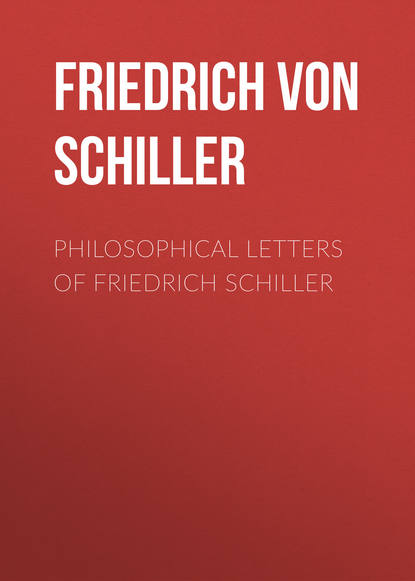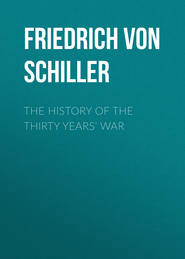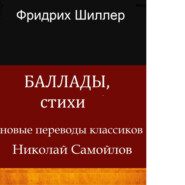По всем вопросам обращайтесь на: info@litportal.ru
(©) 2003-2025.
✖
Philosophical Letters of Friedrich Schiller
Настройки чтения
Размер шрифта
Высота строк
Поля
Although the animal part of man preserves for him the many great advantages of which we have already spoken, still, one may say that, in another aspect, it remains always despicable; viz., the soul thus depends, slave-like, on the activity of its tools; the periodical relaxation of these prescribes to the soul an inactive pause and annihilation at periods. I mean sleep, which, one cannot deny, robs us at least of the third part of our life. Further, our mind is completely dependent on the laws of the body, so that the cessation of the latter puts a sudden stop to the continuance of thoughts, even though we be on the straight, open path towards truth. If the reason have ever so little fixed upon an idea, when the lazy matter refuses to carry it out, the strings of the thinking organs grow weary, if they have been but slightly strained; the body fails us where we need it most. What astonishing steps, one may infer, would man make in the use of his powers if he could continue to think in a state of unbroken intensity! How he would unravel every idea to its final elements; how he would trace every appearance to its most hidden sources, if he could keep them uninterruptedly before his mind! But, alas! it is not thus. Why is it not so?
S 24. – Necessity for Relaxation.
The following will lead us on the track of truth: —
1. Pleasant sensation was necessary to lead man to perfection, and he can only be perfect when he feels comfortable.
2. The nature of a mortal being makes unpleasant feeling unavoidable. Evil does not shut man out from the best world, and the worldly-wise find their perfection therein.
3. Thus pain and pleasure are necessary. It seems harder, but it is no less true.
4. Every pain, as every pleasure, grows according to its nature, and would continue to do so.
5. Every pain and every pleasure of a mixed being tend to their own dissolution.
S 25. – Explanation.
It is a well-known law of the connection between ideas that every sensation, of whatever kind, immediately seizes another of its kind, and enlarges itself through this addition. The larger and more manifold it becomes, so much the more does it awaken similar sensations in all directions through the organs of thought, until, by degrees, it becomes universally predominant, and occupies the whole soul. Consequently, every sensation grows through itself; every present condition of the feeling power contains the root of a feeling to follow, similar, but more intense. This is evident. Now, every mental sensation is, as we know, allied to a similar animal one; in other words, each one is connected with more or less movement of the nerves, which take a direction according to the measure of their strength and extension. Thus, as mental sensations grow, must the movements in the nervous system increase also. This is no less clear. Now, pathology teaches us that a nerve never suffers alone: and to say, "Here is a superfluity of strength," is as much as to say, "There is want of strength." Thus, every nervous movement grows through itself. Now, we have remarked that the movements of the nervous system react upon the mind, and strengthen the mental sensations;
[Why, how one weeps when one's too weary!
Tears, tears! why we weep,
'Tis worth inquiry: – that we've shamed a life,
Or lost a love, or missed a world, perhaps?
By no means. Simply, that we've walked too far,
Or talked too much, or felt the wind in the east, etc.
– Aurora Leigh.]
vice versa, the strengthened sensation of the mind increase and strengthen the motions of the nerves. Thus we have a circle, in which sensation must always increase, and nervous movements every moment become more powerful and universal.
Now, we know that the movements of the bodily frame which cause the feeling of pain run counter to the harmony by which it would exist in well-being; that is, that they are diseased. But disease cannot grow unceasingly, therefore they end in the total destruction of the frame. In relation to pain, it is thus proved that it aims at the death of the subject.
But, the motions of the nerves under pleasant sensations being so harmonious to the continuance of the machinery that the condition of mind which constitutes pleasure is that of the greatest bodily well-being, should not rather, then, pleasant sensation prolong the bloom of the body eternally? This inference is too hasty. In a certain stage of moderation, these nervous motions are wholesome, and really a sign of health. But if they outgrow this stage, they may be the highest activity, the highest momentary perfection; but, thus, they are excess of health, no longer health itself.
We only call that condition of the natural motions health in which the root of similar ones for the future lies, viz., those which confirm the perfection of succeeding motions; thus, the destiny of continuance is essentially contained in the idea of health. Thus, for example, the body of the most debilitated profligate attains to its greatest harmony at the moment of excess; but it is only momentarily, and a so much deeper abatement shows sufficiently that overstraining was not health. Therefore one may justly accept that an overstrained vigor of physical action hastens death as much as the greatest disorder or the worst illness. Both pain and pleasure draw us towards an unavoidable death, unless something be present which limits their advance.
S 26. – Excellence of this Abatement.
It is just this (the limit to their growth) which the abatement of the animal nature causes. It must be no other than this limitation of our fragile frame (that appeared to have lent to our opponents so strong a proof against its perfection) which ameliorates all the evil consequences that the mechanism otherwise makes unavoidable. It is exactly this sinking, this lassitude of the organs, over which tinkers complain so much, that prevents our own strength destroying us in a short time; that does not permit our positions to be always increasing towards our destruction. This limitation shows each passion the period of its growth, its height and decline (if indeed the passion does not die out in a total relaxation of the body), which leaves the excited spirits time to resume their harmony, and the organs to recover. Hence, the highest pitch of rapture, of fear, and of anger, are the same as weariness, weakness, or fainting. But sleep vouchsafes more, for as Shakspeare says: —
Sleep, that knits up the ravelled sleeve of care,
The death of each day's life, sore labor's bath,
Balm of hurt minds, great Nature's sweet restorer.
– Macbeth.
During sleep, the vital forces restore themselves to that healthy balance which the continuance of our being so much requires; all the cramped ideas and feelings, the overstrained actions which have troubled us through the day, are solved in the entire relaxation of the sensorium; the harmony of the motions of the mind are resumed, and the newly-awakened man greets the coming day more calmly.
In relation to the arrangement of the whole, also, we cannot sufficiently admire the worth and importance of this limitation. The arrangement necessarily causes many, who should be no less happy, to be sacrificed to the general order and to bear the lot of oppression. Likewise, many, whom we perhaps unjustly envy, must expend their mental and bodily strength in restless exertion, so that the repose of the whole be preserved. The same with sick persons, the same with unreasoning animals. Sleep seals the eye of care, takes from the prince and statesman the heavy weight of governing; pours new force into the veins of the sick man, and rest into his harassed soul; the daylaborer no longer hears the voice of the oppressor, and the ill-used beast escapes from the tyranny of man. Sleep buries all cares and troubles, balances everything, equips every one with new-born powers to bear the joys and sorrows of the next day.
S 27. – Severing of the Connection.
At length arrived at the point in the circle where the mind has fulfilled the aim of its being, an internal, unaccountable mechanism has, at the same time, made the body incapable of being any longer its instrument. All care for the well-being of the bodily state seems to reach but to this epoch. It appears to me that, in the formation of our physical nature, wisdom has shown such parsimony, that notwithstanding constant compensations, decline must always keep in the ascendancy, so that freedom misuses the mechanism, and death is germinated in life as out of its seed. Matter dissolves again into its last elements, which travel through the kingdom of nature in other forms and relations, to serve other purposes. The mind continues to practise its thinking powers in other circles, and to observe the universe from other sides.
We may truly say that it has not by any means exhausted this actual sphere, that it might have left this sphere itself more perfect; but do we know that this sphere is lost to it? We lay many a book aside which we do not understand, but perhaps in a few years we shall understand it better.
notes
1
Huxley, speaking of psychology and physiology (idealism and materialism), says: "Our stem divides into two main branches, which grow in opposite ways, and bear flowers which look as different as they can well be. But each branch is sound and healthy, and has as much life and vigor as the other. If a botanist found this state of things in a new plant, I imagine he might be inclined to think that his tree was monoecious, that the flowers were of different sexes, and that, so far from setting up a barrier between the branches of the tree, the only hope of fertility lay in bringing them together. This is my notion of what is to be done with physics and metaphysics. Their differences are complementary, not antagonistic, and thought will never be completely fruitful until the one unites with the other." – HUXLEY, Macmillan's Mag., May 1870.
Descartes' method (according to Huxley) leads straight up to the critical idealism of his great successor, Kant, in declaring that the ultimate fact of all knowledge is a consciousness and therefore affirming that the highest of all certainties, and indeed the only absolute certainty, is the existence of mind. But it stops short of Berkeley in declaring that matter does not exist: his arguments against its existence would equally tend to prove the non-existence of soul. In Descartes' stem, the body is simply a machine, in the midst of which the rational soul (peculiar to man) is lodged, and which it directs at its will, as a skilful engineer familiar with its working might do – through will and through affection he can "increase, slacken, and alter their movements at his pleasure." At the same time, he admits, in all that regards its mere animal life – in active functions, such as those connected with hunger, respiration, sleep, digestion; in many passive ones, such as we are accustomed to call mental, as in memory, the perception of color, sound – a purely automatic action of the body, which it pursues simply by following out its own laws, independent of the soul's direction or interference.
2
But we have something more than the animal life of the animal (beast). A beast lives an animal life in order that it may experience pleasant sensations. It experiences pleasant sensations that it may preserve the animal life. It lives now, therefore, in order that it may live again tomorrow. It is happy now that it may be happy to-morrow. But it is a simple, an uncertain happiness, which depends upon the action of the organism, it is a slave to luck and blind chance; because it consists in sensation only. Man, too, lives an animal life, – is sensible of its pleasures and suffers its pains. But why? He feels and suffers that he may preserve his animal life. He preserves his animal life that he may longer have the power to live a spiritual one. Here, then, the means differ from the end; there, end and means seem to coincide. This is one of the lines of separation between man and the animal.

















